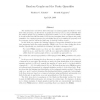Free Online Productivity Tools
i2Speak
i2Symbol
i2OCR
iTex2Img
iWeb2Print
iWeb2Shot
i2Type
iPdf2Split
iPdf2Merge
i2Bopomofo
i2Arabic
i2Style
i2Image
i2PDF
iLatex2Rtf
Sci2ools
STOC
2009
ACM
2009
ACM
Random graphs and the parity quantifier
The classical zero-one law for first-order logic on random graphs says that for every first-order property in the theory of graphs and every p (0, 1), the probability that the random graph G(n, p) satisfies approaches either 0 or 1 as n approaches infinity. It is well known that this law fails to hold for any formalism that can express the parity quantifier: for certain properties, the probability that G(n, p) satisfies the property need
Related Content
| Added | 23 Nov 2009 |
| Updated | 23 Nov 2009 |
| Type | Conference |
| Year | 2009 |
| Where | STOC |
| Authors | Phokion G. Kolaitis, Swastik Kopparty |
Comments (0)

